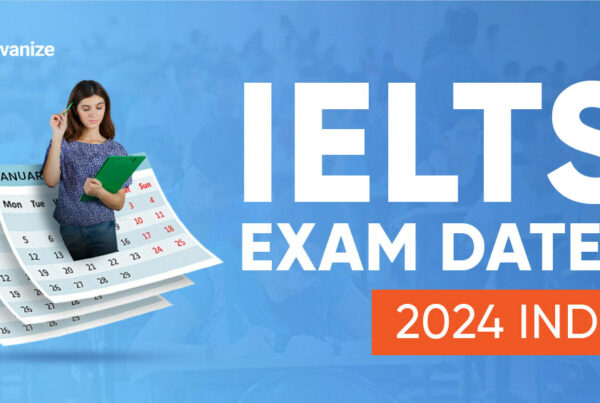
Chapter 1
Overview
While it is true that the IELTS test does not have a separate test for vocabulary terms, vocabulary is used to assess almost every skill in the test. During the skills examinations in Reading, Listening, Writing, and Speaking, you must use a variety of terms with correct pronunciation and spelling. Moreover, vocabulary accounts for 25% of your overall score in the Writing and Speaking sections. The examiners will look at the range and usage of relevant vocabulary in your speaking and writing responses.
So, vocabulary not being a separate segment on IELTS doesn’t make it any less important in your test prep. Ready for a few tips to improve your vocabulary, and some helpful words and phrases?
Importance of Vocabulary in IELTS
IELTS has four sections:
- Listening
- Speaking
- Reading
- Writing.
And all four have one element in common: Vocabulary. This makes vocabulary a crucial element of IELTS prep.
Why should you work on your vocabulary?
- As we already saw, the weightage assigned to vocabulary in the IELTS test is one main reason! Vocabulary contributes to 25% of your score for Speaking and Writing. Your score for Reading and Listening is also dependent on you using the right spellings of words.
- Apart from directly contributing to the score, vocabulary helps you in expressing yourself in the Writing and Speaking sections with greater clarity and precision. This, in turn, will improve your score by showcasing your skills in those areas in the best possible light. In the Reading and Listening segments, having a good vocabulary not only lets you respond to questions, but also find the answers more effectively by skimming and scanning, using synonyms, and connecting contexts.
Chapter 2
Tips to Enhance Your IELTS Vocabulary
Do a lot of reading
Building a massive vocabulary is a crucial aspect of learning English. A large vocabulary will assist you in writing and speaking English, as well as in listening to and reading English. Reading a lot of English-language content is the best approach to expanding your vocabulary. This is because you can see the words and phrases in context. This means you’ll be more likely to recall various terms and phrases, as well as have a greater knowledge of how they’re actually used. The internet is a fantastic resource for finding free reading materials. Computers also provide capabilities that can assist you in comprehending a text. Try to find reading materials that engage your attention. This means you will be ‘interested’ in those texts and thereby be ‘interested’ in decoding the meanings of the words too!
Listen to Audio & Watch Videos
Listening to others use a new word is the best method to learn how to use it yourself. You may watch television shows, news networks, movies, Youtube clips, group chats, and talk shows, among other things. You can also listen to audio files like podcasts, songs, radio stations, and so on, which use a more standardized version of English. Most importantly, watch or listen to things that interest you so that you do not become bored and abandon your objective to learn the language.
Search for New Words
While it is recommended to read books and periodicals and watch TV shows to acquire new vocabulary, it is also necessary to look up academic terms you don’t understand. Many people tend to ignore difficult and unfamiliar phrases, assuming that they will not be needed in their daily lives or exams. However, make it a habit to look up words that you are unfamiliar with, especially if they are difficult to read, spell, or write. The more effort you put into understanding the meaning of a vocabulary item and how it is used, the more likely you are to retain it in your memory.
Keep a Notebook
Having a notebook to jot down new academic vocabulary and its definitions may seem a little archaic, but it may help you comprehend those words better. Besides, as the exam approaches, you can use the book to review the written words. That’s a far better option than scrambling to find new word sources the night before the exam. You can also try using pocket notebooks or sticky notes to make this process more fun. These will help you revisit more recently acquired words.
Keep a Dictionary
Keeping a tiny pocket-sized dictionary with you will be as helpful as it is fun. Whenever you come across a new term, you can first try to guess its meaning from the surrounding information and then check out the dictionary. Do pay attention to the other inputs the dictionary provides for a word than just its meaning. If you’ve never taken the time to study new vocabulary in this way before, now is the time to start.
Read Newspapers
Reading newspapers, specifically, is a good idea because it will familiarize you with the kind of vocabulary that is used in the IELTS test. You can access articles on a daily or weekly basis by subscribing to a daily or weekly paper offline or online. While reading articles, make a note of any academic terms you are unfamiliar with and pay close attention if you learn of a new method to use a word. Then look up the definition of the term in your dictionary and note it down in your notebook. Learn the terms that have been highlighted and review them once or twice a week. This will help you understand Reading passages and write on several IELTS topics.
Try Vocabulary Apps
Nowadays, everyone has a smartphone, and there is a plethora of apps available on the Google Play Store and other app shops that can assist you in improving your language skills. For starters, we recommend using the Ultimate English Vocabulary Prep App, which includes not just word understanding but also activities, explanations, and synonyms that can engage your attention and help you acquire new words at a steady pace. The reason we recommend using Android apps to improve your IELTS speaking vocabulary is that you may use them in your spare time and acquire new words without having to put in too much conscious effort. This helps save time for your studies/work and the other parts of your prep. The vocab app doesn’t even have to be included in your schedule!
Use YouTube
We frequently rely on YouTube for enjoyment but often fail to realize that the platform hosts several useful learning channels too. Many channels feature videos on English vocabulary, including how to pronounce academic words and use them in different contexts.
It is not simple to learn 2000 complex words that are required for your IELTS Writing vocabulary, and you can end up memorizing them without knowing how to use them. Such flaws later become evident in your speech and writing too. Focus on just 100 to 200 new words, and dedicate time to learn them adequately.
Practice
Once you take measures to learn new words, the only thing left to do is to put them into practice.
Choose any Speaking topic or question that has recently been asked in the exam. Then, for 2–3 minutes, try speaking on the topic using the terminology you’ve lately learned. Record yourself as you do this. You should avoid exaggerating sentences just to use one advanced word you have learned. And make sure the vocabulary you use fits your language level in general so that it doesn’t sound rehearsed or memorized. However, do try to think of different vocabulary you can use to avoid repeating the same words often. This is not about repeating the same ideas but bringing variety into your active vocabulary. As you review your recorded response, also see how you could have used different words or phrases to express yourself better.
This applies to the Writing tasks as well. Practice writing on various topics and compare your responses to high-score sample responses to see how you could improve. Look out for repetition and wordiness in your writing so that you can avoid them in the future. Check whether you have used a variety of adjectives and adverbs and whether you have used vocabulary effectively and precisely.
Remember—vocabulary is not just about using difficult-sounding words. Rather, it is about having a wide range of words and phrases that you can use organically in your language.
Don’t Memorize
You can use a word in a variety of settings that do not all mean the same thing. The rationale is simple: while learning a word is straightforward, the same term may not always have the same precise meaning in different contexts. To understand this, look at homophones, which are words that have the same spelling and sound but various meanings. “Bear”, depending on the context, can refer to the animal “bear” or the verb “to bear”, which in turn can mean “to endure” or “to carry”. Furthermore, some words are closely aligned with each other in meaning but cannot replace each other. For example, though “deep” and “profound” have similar meanings, the usage of “a profound hole” (instead of “a deep hole”) is inappropriate.
Sometimes It’s the Simple Things
Vocabulary-building is so widely termed a Herculean task that we lose out on the simple ways in which we can showcase a varied vocabulary. Just think of how many times you use the word “but” to indicate contrast and how rarely you use words like “nevertheless” and “however”. Do you rely on simple connectors like “firstly” and “secondly” instead of coming up with more effective transitions from one paragraph to another?
Here is a list of connectors for you to try and incorporate into your language. Make sure you also look up how to use them correctly!
- To introduce or add ideas: to begin with, firstly, in addition to…
- To show contrast: but, however, in spite of, on the other hand, nevertheless, nonetheless, in contrast, on the contrary, still, yet
- To indicate causes and conditions: since, because of, while…
- To indicate effect and result: consequently, as a result…
- To provide additional support: additionally, again, also, and, as well, besides, equally important, further, furthermore, in addition, moreover, then
- To give examples: or example, for instance, namely, specifically, to illustrate
- To conclude or summarize: finally, in a word, in brief, briefly, in conclusion, in the end, on the whole, thus, to conclude, to summarize, in sum, to sum up
- To indicate time: after, afterward, before, currently, during, earlier, immediately, later, meanwhile, recently, simultaneously, subsequently, then
- To emphasize: even, indeed, in fact, of course, truly
Phrases Count Too
Effective usage of phrases is also a marker of good, spontaneous vocabulary. For example, take the verb “look”. By adding “for” to this verb, we get the phrase “look for”, which means “to search”. To give a couple of other examples, “Look down upon” means “to treat with contempt”, and “look out for” means “to be alert to something”. These are just some of the phrases that can be used and that too, by taking just this one verb as an example. There is a huge range of phrases that you can interweave into your writing or speech, provided you learn how to use them correctly.
Chapter 3
Vocabulary Topics for IELTS
Here is a set of topics with plenty of words and phrases which will help you score well in your IELTS exam, especially in Writing and Speaking Tasks.
Friends
- A lifelong friend
- A relationship of trust
- Arrange a dinner date
- A shoulder to cry on
- Close-knit family
- Dear to my heart
- Distant cousins
- Extend the hand of friendship
- Extended family
- Face to face
- Get to know one another
- Get together
- Immediate family
- Long lost friend
- Long-term relationships
- Nurture our friendship
- Professional relationships
- Relationship problems
- Share a common background
- Share the same ideas
- Stand the test of time
- Struck up a friendship
- To enjoy someone’s company
- To have a good working relationship
- To have a lot in common
- To hit it off
- To keep in touch with
- To lose touch with
Food Vocabulary
- A balanced diet
- A bottle of bubbly
- A decadent chocolate pudding
- A doggy bag
- A scrumptious meal
- A sweet tooth
- An English breakfast
- Calm the hunger pangs
- Candlelit dinner
- Covered in a rich sauce
- Cut down on
- Daily consumption
- Dying of hunger
- Exotic meals
- Fine dining
- Food preparation
- Food production
- Fussy eater
- Home cooked meals
- Homemade food
Travel Vocabulary
- Affordable destinations
- Affordable travel
- Around the world
- Arts and Culture
- Craft markets
- Do as the locals do
- Efficient public transport
- Exotic destinations
- Get around
- Guided tours
- Holiday brochures
- Holiday destination
- Long haul flights
- Lush rainforests
- Magnificent landscapes
- Make advance reservations
- Memorable experiences
- Off the beaten track
- Out of season
- Packaged deals
Environment
- Outskirts of large towns
- Factory emissions
- Toxic fumes
- Traffic jams
- Pollutants in foods
- Pesticides
- Chemical fertilizers
- Commute to work
- Mantra
- Reuse and recycle
- Industrial waste is incinerated
- Facilities for recycling
- Education program
- Consequences
- Campaign
- Scientists predict
- Disintegrate
- Microplastics
- Single-use applications
- Own-brand products
- The policy should be rolled out
- Documentaries
Health
- Balanced diet
- Conscientious about my health
- Flavorsome and appealing
- Convenient takeaway
- Healthier eating habits
- Productive at work
- Processed meat
- Function successfully
- Tempted by diets
- Adopted a vegan diet
- Broad-minded
- Skeptical
- Over-production of meat
- Public service education message
- Positive reinforcement
Student Life
- Challenging
- Day in, day out
- Wide-ranging
- Undergraduate
- Postgraduate
- STEM subjects
- Further education
- Technical colleges
- Vocational studies
- Hands-on training
- To apply for a course
- To get a/an (un)conditional offer
- Halls of residence/student accommodation
- Student union
- A fresher
- An undergraduate
- A graduate
- A graduation ceremony
- To take a gap year
- To drop out of university
- Out of my depth
- Seminar
- Lecture theatre
- Extensive research
Climate Change
- The ravages of something
- Hybrid car
- Carbon footprint
- Recycle
- Growing season
- Yields
- Crops
- Eco-conscious
- Natural fertilizer
- Chemical fertilizer
- Contaminate
- Groundwater
- Vegetable scraps
- Non-chemical compost
- Organic
- Commute
- Solar panels
- Household cleaning products
- Environmentally conscious
- Green lifestyle
- Sustainable
- Emulate
- Conventional products
- Energy saving
- Fuel emissions
- Food miles
- Local food
- Fossil fuels
- Carbon monoxide
Social Media
- Viral
- Troll
- Hater
- Vlogger
- Meme
- Anonymity
- DM
- Emoji
- Badger
- Derogatory
- Censor
- Follow
- Harass
- Catfishing
- Grooming
- Influencer
- Photoshop
- Filters
- Block
- Scam
Fashion
- Clothes horse
- Well put together
- Pick up
- Bargain price
- Be up on the latest trends
- Social media feed
- In fashion
- Replicate
- Looks
- Lower priced
- A fraction of the cost
- A (great) eye for something
- Clothes rack
- Shoe display
- Level of attention
- Luxury goods
- High-end designers
- Out of my price range
- Incomparable
- Over the top
- Avant-garde
- Ambiance
- Unparalleled
- Customer service
- Top-notch
- Blow money on something
- Place pressure on
- Stay current
- Spoiled for choice
- High street
- Unfathomable
- E-shops
- Click of a button
- At your doorstep
- Superimposed
- Frame
- Digital Imagery
- Brick-and-mortar stores
- Counterparts
Secure that dream admit
Right from LOR, University Shortlisting, SOP, Application Reviews till Visa Counselling. Galvanize has your back.
Find out howFAQs
Is vocabulary all about tough words?
When you use words that are difficult or complicated in your IELTS Academic or General Writing, it becomes so evident that the examiner can figure out you’re trying to impress him or her. It appears strange, and your grade will decrease as a result. When it comes to the IELTS Speaking section, you stutter or keep on repeating the statement while looking for complex terms. This impacts your fluency, and you lose marks as a result.
You must, without a doubt, have a large vocabulary, but you must also know how to use it intelligently and effectively. Knowing a large number of words and putting them into your essay or utilizing them in conversation with your examiner without considering their meaning will get you into problems.
Does accent matter in IELTS?
No, your accent won’t be a problem at all. So, don’t worry about it and give your best.
Conclusion:
Essentially, learning English entails observing how English is used and using what you’ve learned to enhance your own English. Reading and listening can help you expand your vocabulary while also demonstrating how English is utilized. You can then apply what you’ve learned while writing and speaking English.
It’s crucial to practice writing and speaking whenever you have the opportunity. Acquiring to write and speak English is similar to learning any other skill, such as cooking or driving. Cooking is learned by doing it and being told how to improve; driving is learned by doing it and being told how to correct yourself.










